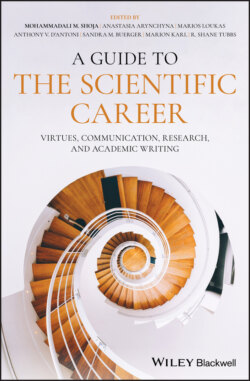Читать книгу A Guide to the Scientific Career - Группа авторов - Страница 61
5.5 Dunning‐Kruger Effect
ОглавлениеThe Dunning‐Kruger effect is the cognitive bias in which people perform poorly on a task but lack the metacognitive capacity to properly evaluate their performance (Figure 5.1). The 1999 study predicted and demonstrated that incompetent individuals would dramatically overestimate their ability and performance relative to the objective criteria (Kruger and Dunning 1999). This suggests that poor problem solvers might not recognize their limitations or situations in which modifications or extra steps are required, or when a problem or project should be referred to a more capable person. This lack of awareness arises because poor performers' lack of skill deprived them not only of the ability to produce correct responses but also of the insight that they are not producing them (Dunning et al. 2003). This genre of studies extends from Confucius's observations centuries ago: achieving and maintaining an adequate measure of the good life means having insight into your limitations. The basis of the studies reflects the idea that the skills needed to produce logical arguments are the same skills that are necessary to recognize when a logical argument has been made. If one lacks the skills to produce the answers, they are also unable to know when their answers or anyone's answers are right or wrong. Thus, incompetence means that individuals cannot successfully fulfill the ability to evaluate responses as correct or incorrect. When those who did not produce the correct responses were taught how to solve the problem or received the skills needed to distinguish accurate from inaccurate, they were able to reevaluate their previous tests to provide more realistic self‐ratings than they had originally given (Kruger and Dunning 1999).
Figure 5.1 The Dunning‐Kruger effect. (a): The unbiased relationship between the confidence or perceived ability and performance or actual ability is represented by a linear line. Imposter syndrome is a component of Dunning‐Kruger effect, in which a highly performing individual presents a low confidence and has inappropriately low perception of his abilities. (b): The biased relationship between confidence and experience is represented by a curve, reflecting the Dunning‐Kruger effect. At one end of the spectrum are inexperienced individuals who have inappropriately inflated confidence toward the task at hand. At the other end of this spectrum are experts whose levels of experience are closely related to their perceived ability and confidence. In the middle are a large proportion of professionals with an inappropriately low confidence toward the performed task.
Kruger and Dunning (2009) noted that there was an undue modesty of top performers and an inflated assessment of lower performers. This study leads to questions of where perceptions of competence come from. It has been reported that the esteem of performances arise from a top‐down approach. People start with a preconceived belief about their skills and use those beliefs to estimate how they are doing on a specific task (Kang 2014). This does not correlate with their actual performance. The top‐down nature of esteem associated with performance can thus have important behavioral consequences. Starting in adolescence, beliefs about oneself generally rise, causing these beliefs to be integrated into the inner aspects of people's lives. This is true in real‐life examples, such as women who rate themselves less scientifically talented than men; with this mindset, they become less enthusiastic in performing scientific or medical activities even though tests show no such difference in their actual performance (Eccles 1987; Ehrlinger and Dunning 2003). It is postulated that perception of performance, and not reality, influences decisions about future activities.
Ignorance more frequently begets confidence than does knowledge.
– Charles Darwin (1871)
